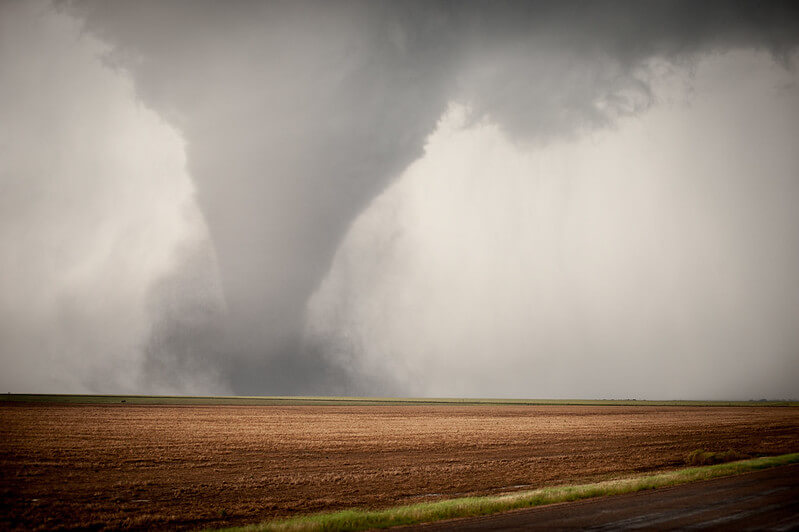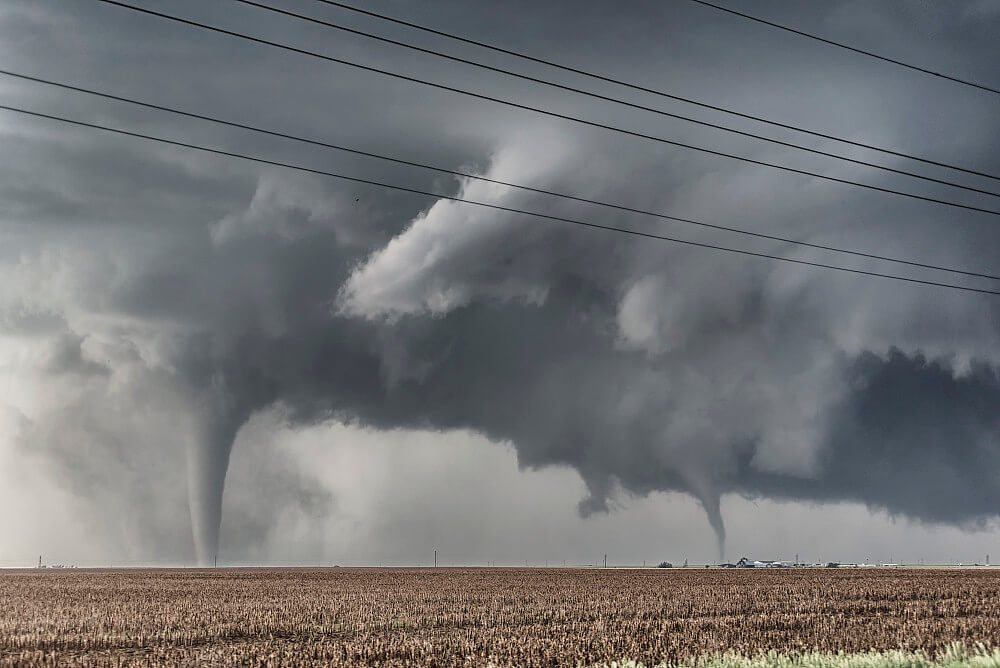A tornado is a violently rotating column of air that can be powerful and destructive. Around 1200 hit the United States every year.
The intensity of a tornado is measured on the Fujita (EF) Scale. The scale rates the tornado between 0 and 5 based on 28 damage indicators.
The higher the rating, the more intense and destructive the tornado, making EF5 tornadoes the most dangerous. Thankfully, over two-thirds of tornadoes are weak and last only seconds.
Today, we’re going to take a closer look at the trajectory of tornadoes and answer a question that often comes up when discussing their path. “Are tornadoes attracted to metal?”
No, whilst it may seem that tornadoes are attracted to metal, they are not. Their direction is determined mostly by wind flows and differences in barometric pressure.
Let’s take a closer look…
Are Tornadoes Really Attracted To Metal?
The myth that tornadoes are attracted to trailer park homes is exactly that, a myth. Tornadoes are NOT attracted to metal or park homes and are driven by wind flows and pressure.
In the US, this means that tornadoes generally flow from west to east, or SW to NE. There are exceptions, tornadoes are highly unpredictable and can change their path in an instant.
Strong downdrafts from nearby thunderstorms can make a big impact on the direction of a tornado.
Tornadoes are not attracted to anything, which makes them incredibly dangerous. If they were, we could manage and control the direction of a tornado and save lots of lives, but this is sadly not the case.
There are lots of myths about tornadoes that are often unknowingly spread, and being attracted to metal is one of them.
Why Do People Believe Tornadoes Are Attracted To Metal?
Some people believe that tornados are attracted to metal because often when a tornado strikes it always seems to demolish trailer park homes.
The myth that trailer parks are tornado magnets has gained a lot of traction in the US, and it’s no surprise as these parks always seem to be getting hit by them.
In reality, trailer parks are no more vulnerable than any other area such as a built-up city or farmhouse.
The reason why this myth has gained traction is due to the massive amount of damage tornadoes do to trailer parks as the homes there are made from metal.
The lack of strong and durable materials that trailer park homes are made from makes it easy for even mild tornadoes to rip them to shreds.
Whereas if that same tornado was on a path through a built-up area may not do as much damage due to the stronger integrity of buildings in the city.
The truth is, trailer parks are common in the “transition zones” on the outskirts of cities where there are more open fields than houses.
New studies show that tornadoes are more likely to strike these areas which is why trailer parks are always seemingly behind hit by these weather events.
Are Tornadoes Attracted To Anything?
Tornadoes are NOT attracted to anything, not metal, not trailer parks, and not water. They’re forces of nature that have no consideration for the landscape around them and will tear through anywhere they please.
They do not actively seek out any particular terrain and instead are driven by updrafts of air that affect the vortex. This means they can move forward, sideways, and even backward.
Tornadoes can double back in a matter of seconds which makes them highly dangerous to chase or get close to.
They can move across the ground at speeds of up to 30 miles per hour which can easily catch storm chasers off-guard.
What Material Can Stop A Tornado?
Stopping a tornado is something that we humans have not yet learned how to do. We’re only just starting to learn their patterns and why they form but have not yet been able to predict them as of yet.
However, there are some materials that can stop or withstand the strength of a tornado’s wind.
Homes built with insulated concrete forms (ICF) maintain their structural integrity during the strong winds of a tornado.
Insulating concrete forms can withstand wind speeds of up to 200mph, which is more than most tornadoes in the US.
However, the strongest EF5 tornadoes can have wind speeds of up to 320mph, which will rip apart any man-made materials we currently know of.
The good news is that EF5 tornadoes with 200mph plus wind speeds are VERY rare. These are the rarest tornadoes on the planet, with only 59 EF-5 tornadoes touching down in the US since 1950.
If you do happen to be moving to a city like Texas that is prone to tornadoes, try to ensure your home is built from ICF.
This will ensure your home has the integrity and strength it needs to withstand most tornadoes, but you’ll also need home insurance, a bunker, and a failsafe plan in case a large tornado strikes.
Final Thoughts
So, are tornadoes attracted to metal? No, they are not. Tornadoes are not attracted to anything, it just looks like they are attracted to metal to some people as they cause so much damage to trailer parks.
Studies show that its the location of trailer parks that makes them seemingly targets for tornadoes. They’re located in “transition zones”, just outside of cities where buildings stop and farmlands start.
This gives the tornado an open plane where it can begin to gain power without the resistance of large city buildings.
Tornadoes being attracted to metal is simply another tornado myth. It would be great if it were true as we could begin to control and manage these dangerous weather events and keep people safe.
In the United States people jokes about mobile homes being magnets for tornadoes, but this isn’t a factual statement and is simply because of the destruction they cause to metal homes.
Thanks for taking the time to read this post and I’ll catch you in the next one!

Hey, I’m Sam – the founder of GustyPlanet. I’ve had a fascination with all things weather for as long as I can remember. I witnessed my first tornado at the age of 6, and since then became an avid storm chaser that is hooked on learning as much as I can about extreme weather. This blog was created to share my knowledge and to expand and delve deeper into the wonderful world of weather phenomena. I hope you enjoy your stay here and thanks for visiting.







